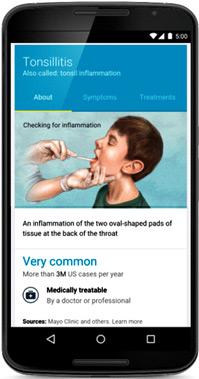Google Adds Cross-Checked Medical Information In Knowledge Graph
- by Laurie Sullivan @lauriesullivan, February 10, 2015

The data will display in Google's Knowledge Graph, the box of information on a desktop or a laptop that typically serves to the right of search engine results. On a mobile device, that information serves up in the results. The data will serve up key information about the query like symptoms, treatments, and details on aspects of the condition such as whether it is contagious.
"We worked with a team of medical doctors (led by our own Dr. Kapil Parakh, M.D., MPH, Ph.D.) to carefully compile, curate, and review this information," Google product manager Prem Ramaswam wrote in a post. "All of the gathered facts represent real-life clinical knowledge from these doctors and high-quality medical sources across the web, and the information has been checked by medical doctors at Google and the Mayo Clinic for accuracy."
The feature will roll out during the next few days in the U.S. in English. In the long run, Google plans to add more medical conditions, and extend the feature to other parts of the world.
Ramaswam acknowledges that this doesn't mean the search results are intended as medical advice. Searchers should use the data for informational purposes only while consulting a healthcare professional. There's an interesting connection to wearable devices and access to quick data.
The access to medical data on wearable devices will be valuable. Berg Insight estimates that shipments of connected wearable devices reached 19.0 million units in 2014. The market should grow at a CAGR of 54.7%, reaching shipments of 168.2 million by 2019.
Fitness and activity trackers are the largest product category, and account for a majority of today's shipments. Decreasing prices and new form factors will enable fitness and activity trackers to reach shipments of 42.0 million units in 2019. The smartwatch category has also begun to reach volumes predicted to become the largest device category reaching shipments, about 90 million devices in 2019, up from 5 million units in 2014.


